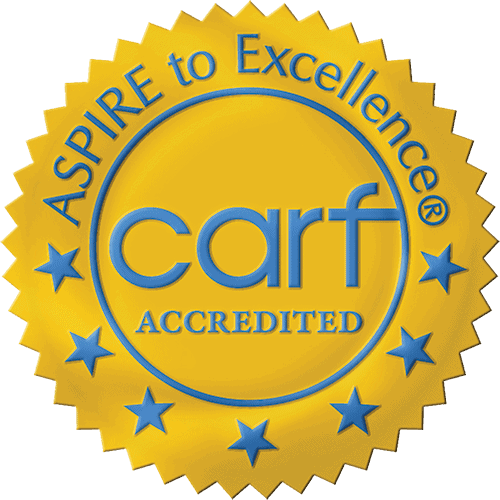Heroin Drug Rehab in San Diego, CA
We Can Help You Overcome Heroin Addiction at Our Caring Facility
Have you found yourself addicted to heroin, fentanyl, or prescription painkillers? They create euphoria but are highly addictive and cause painful withdrawals dependency. An opioid addiction treatment program is the answer.
Heroin and fentanyl have a strong addiction potential. These products rewire your brain’s pathways. Many heroin addicted individuals think that that they're in control of their intake, but they aren’t.
When you stop using the drugs, crushing depression quickly sets in. Pain signals travel through your nervous system and reach the brain. Dopamine production now depends on the presence of the drugs. Ending the addiction with clinical treatment, like at our 'family-owned' heroin rehab in San Diego, is the only way out of the vicious cycle.
Our Heroin Addiction Treatment Program is Based on the Disease Model of Dependency
You’re not in control of your addiction because it’s a disease. Symptoms are both physical and psychological. To deal with both, you undergo substance use disorder treatment. Our Medical Director, Dr. Hirst, is board-certified in Family Medicine and Psychiatry, and is able to provide a unique level of care that encompasses the 'whole patient' as a result of this dual training and expertise.
At our comfortable 'home-like' rehab facility in San Diego, the top addiction experts in the field will work with you to customize a treatment approach. What works for one person doesn’t necessarily work for someone else. That’s why building a curriculum specifically for you is best.
Heroin is Deadly and Often the Destination for Prescription Drug Abusers
Heroin addiction can be devastating for both the user and their loved ones. A heroin user will typically be addicted to more than one drug, especially when it comes to opiates. The signs and symptoms of addiction can apply to any substance abuse.
Heroin is an Addictive Substance
Heroin is a drug that comes from the poppy plant and is in the opiate class of drugs. It’s highly addict and illegal to buy, sell or possess. Millions of people around the globe are addicted to heroin. The high is described as euphoric and sedating. It also numbs pain, both physical and emotional.
Heroin is incredibly addictive. When a person is addicted to heroin, they experience painful and emotional withdrawal symptoms, which makes it difficult to stop using on their own.
Heroin can be used in a number of ways, namely snorting, injecting or smoking. Snorting and injecting are the most common.
Street Nicknames
Heroin is known as a “street drug” because, in the past, it was only sold and purchased on the street. Drug dealers and users often have special code words they use to sell a drug without saying the name outright. In recent years, some drug dealers have been bold enough to sell it on the “dark web” where users can hide their identity more easily. Both ways are dangerous and users never know how “pure” the drug is.
Heroin is also known as:
- H
- Chiba
- Chiva
- China White
- Tar
- Smack
- Brown Sugar
- Junk
- Mud
- Dragon
- Dope
- Number 3
- Boy
- Black Tar
- Black Pearl
- Junk
- Brown
- Brown Crystal
- Brown Tape
- Mexican Mud
- Mexican Horse
- Snow
- Snowball
- Sack
- Skunk
- Number 3
- Number 4
- Number 8
- White
- White Nurse
- White Lady
- White Horse
- White Stuff
Nicknames for heroin change with the times, so there are other code names that may not be listed here.
Heroin Signs and Symptoms

While under the influence, there are several symptoms a heroin user will display. Their eyes may have constricted pupils. They will probably appear sleeping, or “nod out” when sitting up, even if they are in the middle of conversation with you. Their mood may appear giddy or euphoric, while at the same time they may seem completely disoriented. Usually they will breathe differently or seem short of breath.
Other opioid or opiates (synthetic opioid-like drugs) will have similar symptoms to these. If you’re unsure the person is high, or they seem sick, are turning blue, or won’t wake up, call 911.
Heroin is Frequently Sought Out after Prescription Drugs are Too Hard to Obtain
All "opioid" drugs come from the poppy plant and therefore are highly addictive. The opioid epidemic is fueled by the addictive properties of opioids. Drugs like Oxycontin and Percocet are often prescribed for acute pain with devastating results. Many people taking these drugs for pain find that they develop a tolerance. Users will gradually be lead to addiction. They often find that they need more and more of the drug to get high – and when they try to cease using, they experience painful or frightening side effects.
With an addiction epidemic still raging in the US, research has shown that there are serious consequences to opioid addiction. In states that once had the largest supply of pill mills, overdose rates went up as the pill supplies went down. Many people who made the choice to use heroin didn’t feel like they had any choice at all; their supplies of drugs like Oxycontin and Percocet were cut off unexpectedly.
Many people decided to move to heroin in order to avoid the dangers of withdrawal symptoms. Unfortunately, heroin is stronger than many prescription drugs and causes more overdoses in its users.
What Are the Long-Term Effects and Dangers of Heroin Use?
Heroin is a dangerous drug in the narcotic class. There is no “safe” or casual heroin use. It’s highly addictive. Many people who use the drug are exposed to HIV and other diseases transmitted via blood. Heroin causes people to take risks that they don’t normally take, including sexual behavior that can cause STD transmission.
Heroin users are often unhealthy and may suffer from malnutrition. If they inject heroin or get itchy from frequent use, they may have frequent skin infections. Over time, many people who use the drug end up with serious disease such as infections of the heart and diseases of the liver or kidneys.
Heroin is a dangerous drug and long-term use makes it difficult for the user to quit using on their own, especially due to heroin withdrawal.
What are the Symptoms of Heroin Withdrawal?
Heroin is a drug that is known for its intense high, and, unfortunately its intense withdrawal effects. When a user wants to give up heroin, they often try to stop using the drug on their own. Soon, symptoms of with withdrawal will begin, and they will last for days. People who cease using heroin may have painful stomach and muscle cramps, sweat profusely, and complain of joint pain. They may vomit or have intense diarrhea.
Withdrawal may be dangerous if a person has an underlying health condition. Some people may experience seizure and heart palpitations. If this sounds like something you have experienced in the past, it’s important that you find a safe detox program to help you get clean. If you are experiencing these problems right now, please seek medical attention.
A supervised detox facility will help make you as safe and comfortable as possible. You can be monitored for any dangerous symptoms. At the same time, you’ll be in an environment with trained addiction recovery professionals. You can get the help you need detoxing and learning more about recovery at the same time.
Medication-Assisted Treatment for Heroin Withdrawal
Our clinical staff will use whatever tools are available to assist our client's recovery and this includes the prescribing and dispensation of drugs to help adjust craving like Suboxone, Sublocade, and Subutex (all brand names for buprenorphine).
Our medical director will continue existing prescriptions and (where appropriate) write a prescription for MAT medications like these. Then, our clinical staff can manage the dispensation of the medication at the assigned times.
It's very helpful to have all clinical parts of the recovery support team in communication with each other like they are at Present Moments. Dr. Milgram will be in charge of both the prescribing of the medications, monitoring your progress, and managing your personalized treatment regimen. This way, the treatment is holistic and truly supportive in nature.
Medication-assisted treatment (MAT) for heroin addiction combines medication with behavioral health services. It has been shown to not only save lives but also increase recovery rates. Present Moments Recovery maintains the availability of MAT medications (when appropriate) throughout the entire continuum of care we offer.
MAT significantly reduces the risk of relapse and opioid overdose deaths. In fact, the risk of relapse for someone with an opioid use disorder after detox only is 70%; heroin is 91%. MAT drastically reduces that risk.
Medication-assisted treatment reduces cravings, anxiety, withdrawal symptoms, and post-acute withdrawal syndrome, which can cause severe withdrawal symptoms to recur up to a year after treatment, interfering with an individual’s ability to continue or engage in other therapies. Managing these physical issues allows the individual to focus their attention on their psychological, emotional, and spiritual needs through therapy, group meetings, and recovery support groups.
At Present Moments, MAT is used in combination with interdisciplinary interventions, including evidence-based therapies like dialectical behavioral therapy (DBT) and cognitive behavioral therapy (CBT). We also assess each patient for mental health issues so that we can address them, as well as other healthcare needs that may come up in the assessment process, such as chronic pain.
Studies show that MAT, when coupled with counseling, greatly increases one's ability to attain long term sobriety.
San Diego's Premiere Comprehensive Continuum of Care Model
Addiction is progressive and destructive to the person who is caught in its grasp. But recovery is attainable for those who come to a reputable treatment center and get the help they need to recover.
‘Home-Like’ Setting and Incredible Value
After making sure that detox takes care of withdrawals and physiological symptoms, we offer residential treatment for the first 1-3 months of sobriety in a comfortable ‘home-like’ setting where individualized attention can place a person’s needs in early recovery at the forefront. Welcome to recovery in an ambience of family and home.
We specialize in helping recovering men and women establish a firm foundation in recovery, so after facilitating the detox process all the way through residential (or inpatient) rehabilitation, we assist them in planning for a ‘step down’ program to receive “after care.” If our client is going to remain in the local San Diego area, we will typically continue counseling the individual on an outpatient basis as he or she moves into a local sober living house (or returns home).
Longer Treatment Period = Greater Long-Term Success
Our family run treatment center is able to provide a much longer treatment period for the same cost that most rehabs offer a 28 day program. The standard length of time for our continuum of care is 90 days, which creates a very solid foundation of sobriety and newly learned behaviors in the men and women whom we treat.
There are countless medical studies which have clearly demonstrated a correlation between longer treatment periods and better outcomes (ie long-term sobriety). This is one of the reasons that Present Moments has been so successful in helping women and men get “over the hump” of initial sobriety and truly establish a rewarding and uplifting life without the use of their drug of choice.
Getting Help for Heroin Addiction in San Diego
Do you or someone you love have a problem with heroin or another addictive substance? Recovery is possible, but you can’t do it without reaching out for help. Call use to learn about your options. We can also answer any questions you may have about treatment or insurance at 1-619-363-4767.



